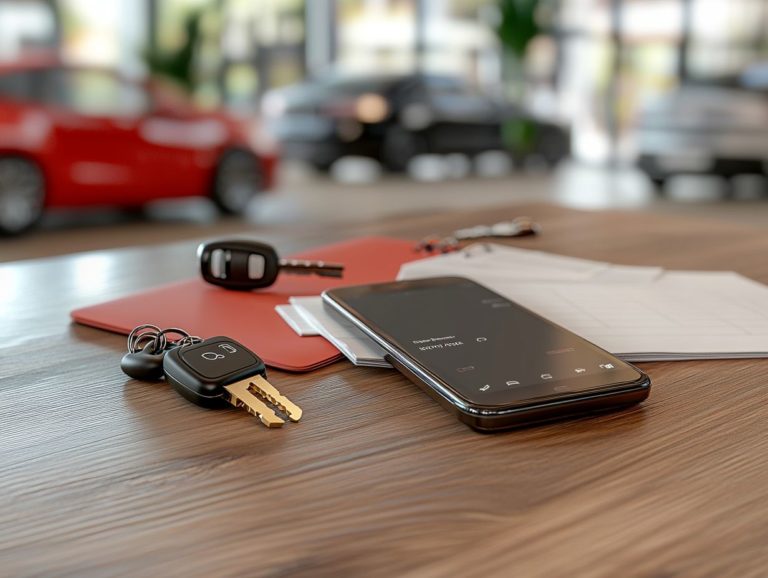5 Tips for First-Time New Car Buyers
Buying your first new car is an exhilarating journey. However, it can also feel overwhelming. With many options and factors to consider, approaching the process with a thoughtful plan is essential.
Here are five key tips to guide you through budgeting, researching models, and negotiating the best deal:
- Explore the benefits and drawbacks of new car ownership.
- Prepare effectively for the buying process.
- Uncover common pitfalls to avoid.
- Make informed decisions.
- Drive away with a sense of satisfaction.
Contents
- Key Takeaways:
- 1. Determine Your Budget and Stick to It
- 2. Research and Compare Different Car Models
- 3. Consider Your Needs and Lifestyle
- 4. Don’t Be Afraid to Negotiate
- 5. Don’t Forget About Additional Costs
- What Are the Benefits of Buying a New Car?
- Frequently Asked Questions
- What are the benefits of following these 5 tips for first-time new car buyers?
- Should I buy a new or used car as a first-time buyer?
- Why is setting a budget important when buying your first car?
- How can I negotiate a great deal on a new car as a first-time buyer?
- What should I keep in mind when choosing my first car?
- Should I read reviews before buying my first car?
Key Takeaways:

- Set a budget to avoid overspending.
- Research to find the best car for your needs.
- Tailor your choice to your lifestyle and family size.
1. Determine Your Budget and Stick to It
When purchasing your first car, establishing a budget is essential for a successful transaction. This helps you navigate payment options and shields you from unexpected expenses, like dealership fees or hidden costs. To explore the best choices, consider the top 5 financing options for first-time car buyers.
Understanding your financial situation involves identifying a realistic price range that aligns with your income and expenses. This exploration can unveil different ways to pay for the car, including enticing dealership financing offers aimed at first-time buyers.
Securing preapproval for an auto loan strengthens your negotiating position. Understand the total out-the-door price, which is what you ll actually pay, including taxes and fees. This knowledge can significantly impact your overall financial commitment.
2. Research and Compare Different Car Models
Thoroughly researching and comparing different car models is crucial, especially when weighing options between new and used cars like the Honda Civic and Toyota Camry. This process ensures you select a reliable first car that aligns with your needs and budget.
As you embark on this research journey, consider key factors that will greatly impact your long-term satisfaction. Check out the reliability ratings, fuel efficiency, and safety rankings they can make or break your car experience!
Utilizing trusted resources like Edmunds and Kelley Blue Book provides valuable insights into vehicle history reports and current market values. This enables you to make informed decisions. Exploring certified pre-owned vehicles can also be advantageous, as they typically come with warranties and have passed rigorous inspections.
By meticulously comparing various purchase options, you can discover a car that fits seamlessly into your lifestyle and financial situation.
3. Consider Your Needs and Lifestyle
When selecting your first car, it’s essential to reflect on your unique needs and lifestyle. Considering the essential tips for buying used cars can significantly affect your monthly car payment, insurance costs, and overall satisfaction with the vehicle over time.
For instance, consider how far you commute to work each day; this can lead to substantial variations in fuel efficiency requirements. If you have a larger family, you ll likely need a more spacious vehicle, where safety and comfort take center stage.
Your driving habits whether you frequently embark on long trips or navigate tight urban parking also play a crucial role in determining the ideal type of car for you.
Exploring eco-friendly options can mitigate your environmental impact and lower your car insurance premiums, enriching your overall budget considerations.
Before you seal the deal, prioritize test-driving various models to ensure that your chosen vehicle aligns seamlessly with your lifestyle demands.
Ready to take the next step? Visit your local dealership or use online car comparison tools to find the perfect match!
4. Don’t Be Afraid to Negotiate

One of the most critical aspects of purchasing your first car is to embrace the art of negotiation. Mastering this skill can significantly lower your final cost and help you avoid new car buying mistakes, elevating your overall car-buying experience.
To embark on this journey, it s wise to conduct thorough research on the vehicle’s market value before buying. Understanding the dealership s pricing strategies will give you a distinct advantage during negotiations, enabling you to make more informed choices.
Negotiation goes beyond the sticker price; it’s also essential to delve into financing rates, down payments, and other contractual terms. As a first-time buyer, consider exploring the best used cars for first-time buyers and tapping into specialized programs designed to assist you.
These resources can help you snag better deals and ultimately lead to more favorable financial outcomes. Take charge of your car-buying journey today!
5. Don’t Forget About Additional Costs
When budgeting for your first car, don’t overlook those additional costs that can sneak up on you, such as:
- Insurance premiums
- Dealership fees
- Routine maintenance
- Fuel costs
Beyond just the sticker price, you’ll want to keep an eye on ongoing expenses like car insurance, which can fluctuate considerably based on your driving history and the coverage you select. Routine maintenance and unexpected repairs can really take a bite out of your budget, especially as your vehicle ages.
Let s not forget fuel costs; they play a crucial role in your long-term financial planning, with gas prices that can vary wildly and influence your monthly expenditures.
All of these factors can add up quickly, potentially impacting your overall financial stability and savings goals. Understanding car depreciation, which means your car loses value over time, is key; so, it s smart to factor this into your purchase decision to ensure you’re making a wise investment.
What Are the Benefits of Buying a New Car?
Purchasing a new car brings a wealth of advantages, including:
- Enhanced reliability
- State-of-the-art features
- Comprehensive warranties
These benefits cater to the latest technological marvels, from sophisticated infotainment systems to fuel-efficient engines, while also spotlighting safety with advanced collision avoidance technologies and superior crash test ratings.
New vehicles typically offer greater reliability compared to their pre-owned counterparts, resulting in fewer unexpected repairs and instilling a comforting sense of security in drivers.
With extensive warranties that cover both mechanical and electrical components, you can rest easy knowing your investment is well-protected. This perfect blend of heightened safety and reduced maintenance costs ultimately enhances your driving experience, allowing you to savor the journey ahead without the anxiety of unexpected issues.
What Are the Drawbacks of Buying a New Car?
While purchasing a new car offers several enticing advantages, it’s essential to consider tips for buying a new car during a recession to navigate some notable drawbacks as well.
Significant depreciation, higher upfront costs, and potentially elevated insurance rates are factors that first-time buyers should not overlook.
Car depreciation is an unavoidable reality of vehicle ownership. New vehicles can lose a substantial percentage of their value within just the first few years, leading to higher monthly payments and a greater financial burden, particularly as the initial purchase price soars.
The resulting elevated costs can create a ripple effect on your overall affordability, making it increasingly difficult to stick to a budget especially with new car prices on the rise. Therefore, it s crucial for prospective buyers to carefully weigh both the immediate benefits and the long-term financial consequences before making a decision.
How Can You Prepare for the Buying Process?

Preparing for the car buying journey entails several important steps. These steps include obtaining auto loan preapproval, understanding your credit history, and creating a thorough car purchase checklist.
Before stepping foot in the dealership, invest time in researching various loan options. Different lenders can present varying terms and interest rates that may significantly affect your monthly payments.
Gathering essential documentation, such as proof of income and identification, will streamline the financing process. Familiarizing yourself with your credit history is equally important; a robust credit score can unlock more favorable financing options, while a less-than-ideal rating might restrict your choices.
By crafting a comprehensive checklist for evaluating potential vehicles, you can ensure that crucial factors like safety ratings and fuel efficiency are front and center. This leads to a more well-considered choices process.
What Are the Most Important Features to Look for in a New Car?
When you re in the market for a new car, pinpointing the features that align with your needs is crucial. Focus on safety, fuel efficiency, and technology to ensure a satisfying purchase experience.
These elements are essential for evaluating the overall reliability and satisfaction of your vehicle. For example, safety ratings offer you peace of mind by illustrating how well the car performs in crash tests and its capacity to protect passengers.
Fuel economy speaks directly to your long-term savings and environmental footprint, making it a key consideration for many buyers.
Technology integrations elevate your driving experience by providing connectivity, navigation, and entertainment options. These features can transform daily commutes into something more enjoyable. Together, these factors not only enhance your immediate enjoyment but also contribute significantly to the enduring value of your new car.
What Are Some Common Mistakes First-Time New Car Buyers Make?
First-time car buyers often stumble into common pitfalls, such as neglecting to research both the vehicles and financing options available to them. To avoid these issues, exploring ways to save money on your new car purchase can help prevent overextending their budgets, leading to purchases they may come to regret and financial strain.
Many overlook the critical importance of understanding the final cost, which includes all taxes and fees that can significantly influence the amount you pay.
It s easy to be misled about financing rates; even small discrepancies can have a substantial impact on your monthly payments over time. Rushing through the buying process can lead to hasty decisions that don t align with your long-term financial goals.
Don t let these challenges trip you up! Create a budget now to ensure you make the best choice. Explore various financing options thoroughly and take your time in the decision-making process.
How Can You Get the Best Deal on a New Car?
Securing the best deal on a new car requires your strategic negotiation skills, a keen eye for different financing options, and an understanding of mastering the test drive to yield significant savings with first-time buyer programs.
To achieve a favorable outcome, it s vital to conduct thorough research on the various financing options available from different lenders. Also, evaluate dealership offers that might include enticing promotions or incentives.
Armed with this information, you ll be able to negotiate more effectively, potentially lowering both the purchase price and financing rates. First-time buyer programs often come with unique benefits, such as reduced interest rates or down payment assistance.
By taking advantage of these financial aids, you not only simplify the purchase process but also position yourself to make well-informed decisions that lead to substantial savings.
Frequently Asked Questions

What are the benefits of following these 5 tips for first-time new car buyers?
Following these tips can save you money, ensure you get the best deal, and help you make a well-informed decision when purchasing your first new car.
Should I buy a new or used car as a first-time buyer?
It depends on your budget and needs. A new car has the latest features and warranties, while a used car is often more affordable.
Why is setting a budget important when buying your first car?
A budget helps you narrow down your choices and prevents overspending. You must also include costs like insurance, maintenance, and taxes.
How can I negotiate a great deal on a new car as a first-time buyer?
Research the average price of the car you want and negotiate confidently. If the price is too high, don t hesitate to walk away.
What should I keep in mind when choosing my first car?
Think about your needs, lifestyle, and budget. Consider fuel efficiency, safety features, and maintenance costs.
Test drive different models to find the right fit for you.
Should I read reviews before buying my first car?
Yes! Reviews from experts and other drivers offer valuable insights into a car’s performance and reliability.
They can help you make a smarter choice.






